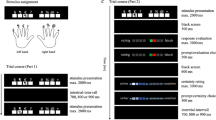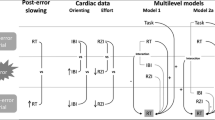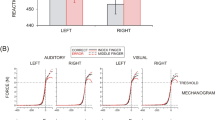Summary
In an eight-choice reaction task, the influence of erroneous responses upon the temporary changes in the level of heart rate (HR) was studied. It was shown that after errors there was a short-term deceleration of the HR-level, while after correct responses an accelerating tendency was found. This phenomenon has to be regarded as an additional source of fluctuations of the HR-level. Therefore, it has to be taken into account when suppression of sinus arrhythmia is used for assessing the level of mental load.
Similar content being viewed by others
Literature
Bartenwerfer, H.: Herzrhythmik-Merkmale als Indikatoren psychischer Anspannung. Psychol. Beitr. 4, 7–25 (1960).
Connor, W. H., Lang, P. J.: Cortical slow-wave and cardiac rate responses in stimulus orientation and reaction time conditions. J. exp. Psychol. 82, 310–320 (1969).
Danev, S. G., Wartna, G. F.: Information load and time stress; some psychophysiological consequences. TNO-Nieuws 25, 385–395 (1970).
— —, Bink, B., Radder, J. J., Luteyn, I.: Psychophysiological assessment of information load. Ned. T. Psychol 26, 1, 23–39 (1971a).
—, De Winter, C. R., Wartna, G. F.: On the relation between reaction and motion time in a choice reaction task. Acta psychol. (Amst.) 35, 3, 188–197 (1971b).
— —: Expectation, attention, and heart rate deceleration. Leiden: Neth. Inst. for Preventive Medic./TNO (internal report) 1970.
Ettema, J. H.: Arbeidsfysiologische aspecten van mentale belasting. Assen: Van Gorcum 1967.
Folkins, C. H.: Temporal factors and the cognitive mediators of stress reaction. J. person. soc. Psychol. 14, 173–184 (1970).
Johnson, H. J., May, J. R.: Phasic heart rate changes in reaction time and time estimation. Psychophysiology 6, 351–356 (1969).
Jonge, H. de: Inleiding tot de medische statistiek. Leiden: Verhandelingen N.I.P.G. 1964.
Kalsbeek, J. W. H.: Mentale belasting. Assen: Van Gorcum 1967.
Kohlová, J., Matoušek, O.: Changes in some vegetative functions due to a mental task under laboratory conditions. Čs. Psychol. 12, 49–62 (1968) (in Czech).
Koster, W. G.: Sinus arrhythmia and training. Eindhoven: Inst. for Perc. Research (ann. progress report) 1968.
Lacey, B. C., Lacey. J. I.: Change in cardiac response and reaction time as a function of motivation. Paper presented at the meeting of the Soc. for psychophysiological Research, Denver, oct. 1966.
Lacey, J. I.: Somatic response patterning and stress: some revisions of activation theory. In: Appley, M. H., Trumbull, R. (Eds.): Psychological stress; issues in research. New York: Appleton-Century-Crofts 1967.
Laurig, W., Philipp, U.: Veränderungen der Pulsfrequenzarrhythmie in Abhängigkeit von der Arbeitsschwere. Arbeitsmed. Sozialmed. Arbeitshyg. 5, 184–187 (1970).
Loos, F. A.: Onderzoek van de zintuigelijk-mentale belasting. IJmuiden: Kon. Ned. Hoogovens (intern report) 1968.
Maas, J. van der: Meetmethoden om de mentale belasting af te leiden uit de sinusaritmie. Utrecht: Med. Fysisch Instit./TNO (intern report) 1968.
Meers, A., Verhaegen, P.: Sinusarrhythmia, information transmission and emotional tension. Leuven: Kath. Universiteit, Dept. Psychology (intern report) 1970.
Mulder, G., Hoogstraten, J.: De sinusaritmie als meetinstrument voor mentale belasting. Amsterdam: Lab. voor ergonomische Psychologie/TNO (intern report) 1969.
Raskin, D. C., Kotses, H., Bever, J.: Cephalic vasomotor and heart rate measures of orienting and defensive reflexes. Psychophysiology 6, 149–159 (1969).
Sokolov, E. N.: Neuronal models and the orienting reflex. In: Brazier, M. A. B., (Ed.): The central nervous system and behavior. New York: J. Macy 1960.
Tursky, B., Schwartz, G. E., Crider, A.: Differential patterns of heart rate and skin resistance during a digit-transformation task. J. exp. Psychol. 83, 451–457 (1970).
Wartna, G. F., Danev, S. G.: Sinus arrhythmia as a measure for mental load: a comparison of different scoring methods. Leiden: Neth. Instit. for Prev. Medicine/TNO (intern report) 1970.
Webb, R. A., Obrist, P. A.: The physiological concomitants of reaction time performance as a function of preparatory interval and preparatory interval series. Psychophysiology 6, 389–403 (1970).
Author information
Authors and Affiliations
Rights and permissions
About this article
Cite this article
Danev, S.G., de Winter, C.R. Heart rate deceleration after erroneous responses. Psychol. Forsch. 35, 27–34 (1971). https://doi.org/10.1007/BF00424472
Received:
Issue Date:
DOI: https://doi.org/10.1007/BF00424472




